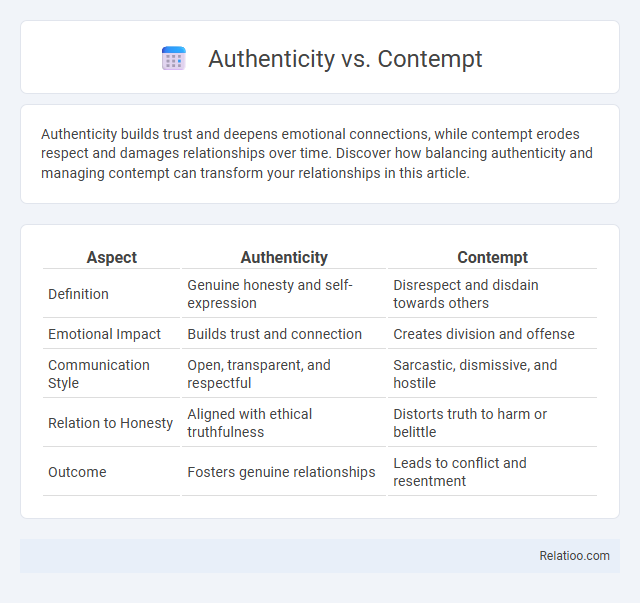Authenticity builds trust and deepens emotional connections, while contempt erodes respect and damages relationships over time. Discover how balancing authenticity and managing contempt can transform your relationships in this article.
Table of Comparison
| Aspect | Authenticity | Contempt |
|---|---|---|
| Definition | Genuine honesty and self-expression | Disrespect and disdain towards others |
| Emotional Impact | Builds trust and connection | Creates division and offense |
| Communication Style | Open, transparent, and respectful | Sarcastic, dismissive, and hostile |
| Relation to Honesty | Aligned with ethical truthfulness | Distorts truth to harm or belittle |
| Outcome | Fosters genuine relationships | Leads to conflict and resentment |
Understanding Authenticity: Core Principles and Importance
Authenticity involves embracing honesty, self-awareness, and consistency in actions, fostering genuine connections and trust in personal and professional relationships. Understanding authenticity is crucial for emotional well-being, as it encourages individuals to express their true selves without fear of judgment or rejection. Recognizing the destructive nature of contempt--marked by disdain and disrespect--highlights the importance of nurturing authentic interactions that promote empathy and mutual respect.
The Roots and Manifestations of Contempt
Contempt originates from deep-seated feelings of superiority and disrespect, often rooted in unresolved emotional wounds or learned behaviors from toxic relationships. It manifests through condescending language, nonverbal cues such as eye-rolling, and dismissive attitudes that erode trust and intimacy in personal and professional interactions. Recognizing these signs enables the cultivation of authenticity, fostering genuine connections and emotional safety.
Psychological Impact of Authenticity in Relationships
Authenticity in relationships fosters psychological well-being by promoting trust, emotional safety, and genuine connection, reducing stress and enhancing intimacy. Contempt, characterized by disdain and disrespect, damages relationships by increasing conflict, emotional pain, and long-term dissatisfaction. The contrast underscores that authenticity cultivates resilience and mutual understanding, essential for healthy psychological functioning within interpersonal bonds.
Contempt: A Silent Destroyer of Trust
Contempt, characterized by disdain and disrespect, silently erodes the foundation of trust in relationships by fostering feelings of inferiority and resentment. Unlike authenticity, which promotes genuine connection and understanding, contempt creates emotional distance and hostility, undermining effective communication. Persistent contempt can lead to the breakdown of intimacy and cooperation, making it one of the most destructive forces within personal and professional interactions.
Authentic Communication vs. Contemptuous Interactions
Authentic communication fosters trust and empathy by encouraging open, honest exchanges where your true feelings and intentions are respected and understood. Contemptuous interactions, characterized by sarcasm, mockery, or disdain, erode relationships by generating resentment and emotional distance. Prioritizing authenticity over contempt enhances connection and promotes healthier, more meaningful dialogues in personal and professional settings.
How Authenticity Fosters Connection and Growth
Authenticity fosters genuine connection by encouraging open communication and vulnerability, which builds trust and emotional safety in relationships. Unlike contempt, which erodes respect and creates barriers, authentic expression promotes mutual understanding and empathy, driving personal and relational growth. Embracing authenticity allows individuals to address conflicts constructively, enhancing intimacy and resilience in social bonds.
Warning Signs of Contempt in Personal and Professional Life
Contempt in personal and professional life often reveals itself through sarcastic remarks, eye-rolling, and dismissive body language, signaling deep-seated disrespect that undermines trust and collaboration. You might notice frequent belittling comments or a persistent tone of superiority that erodes genuine connections and creates toxic environments. Recognizing these warning signs early can help preserve authenticity and promote healthier relationships.
Strategies to Cultivate Authenticity and Reduce Contempt
Cultivating authenticity involves fostering self-awareness and embracing vulnerability, allowing you to communicate honestly and build genuine connections. Reducing contempt requires practicing empathy, reframing negative judgments, and focusing on positive aspects of others to break down barriers. Consistent mindfulness and open dialogue can transform relationships by replacing contempt with respect and fostering deeper authenticity.
Case Studies: Authenticity Triumphs Over Contempt
Case studies reveal that authenticity in communication fosters trust and strengthens relationships, contrasting sharply with the damaging effects of contempt, which leads to resentment and conflict escalation. For instance, research on couples' therapy demonstrates that partners expressing genuine emotions and vulnerabilities experience higher satisfaction and conflict resolution success compared to those exhibiting contemptuous behaviors. Organizations adopting authentic leadership witness improved employee morale and collaboration, highlighting that authenticity consistently triumphs over contempt in both personal and professional contexts.
Building a Culture of Authenticity for Lasting Fulfillment
Building a culture of authenticity requires fostering open communication, trust, and vulnerability to counteract contempt, which erodes relationships and undermines team cohesion. Authenticity promotes genuine connections and psychological safety, essential for lasting fulfillment and workplace satisfaction. Emphasizing empathy and respect creates an environment where employees feel valued and motivated to contribute their true selves.

Infographic: Authenticity vs Contempt
 relatioo.com
relatioo.com